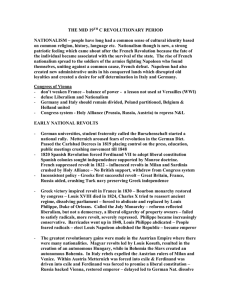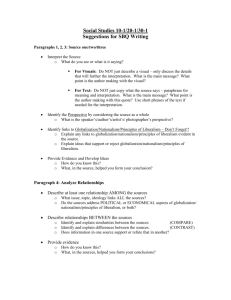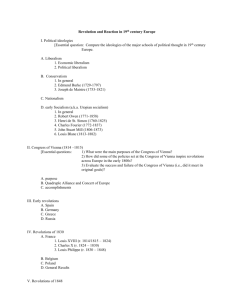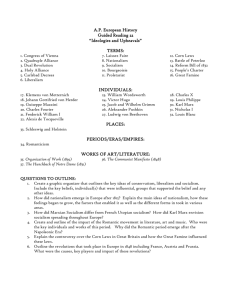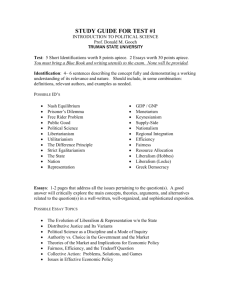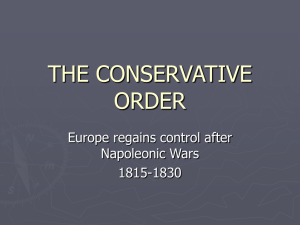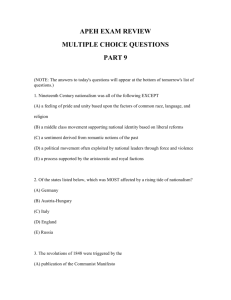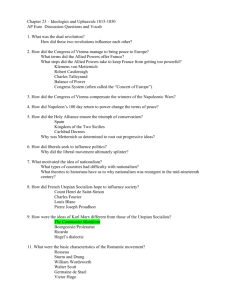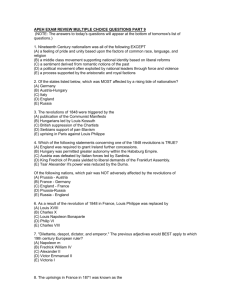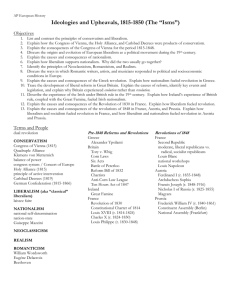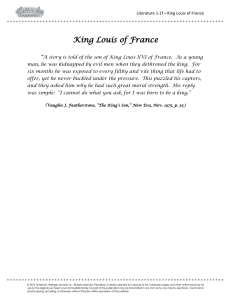File - AP EURO
advertisement
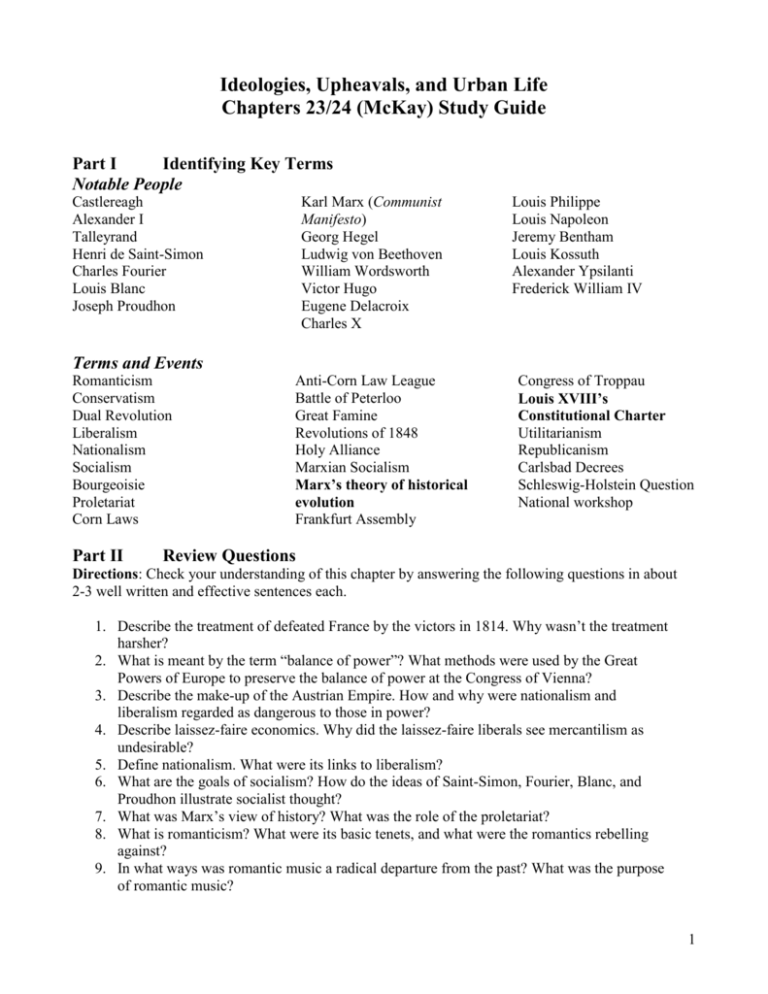
Ideologies, Upheavals, and Urban Life Chapters 23/24 (McKay) Study Guide Part I Identifying Key Terms Notable People Castlereagh Alexander I Talleyrand Henri de Saint-Simon Charles Fourier Louis Blanc Joseph Proudhon Karl Marx (Communist Manifesto) Georg Hegel Ludwig von Beethoven William Wordsworth Victor Hugo Eugene Delacroix Charles X Louis Philippe Louis Napoleon Jeremy Bentham Louis Kossuth Alexander Ypsilanti Frederick William IV Terms and Events Romanticism Conservatism Dual Revolution Liberalism Nationalism Socialism Bourgeoisie Proletariat Corn Laws Part II Anti-Corn Law League Battle of Peterloo Great Famine Revolutions of 1848 Holy Alliance Marxian Socialism Marx’s theory of historical evolution Frankfurt Assembly Congress of Troppau Louis XVIII’s Constitutional Charter Utilitarianism Republicanism Carlsbad Decrees Schleswig-Holstein Question National workshop Review Questions Directions: Check your understanding of this chapter by answering the following questions in about 2-3 well written and effective sentences each. 1. Describe the treatment of defeated France by the victors in 1814. Why wasn’t the treatment harsher? 2. What is meant by the term “balance of power”? What methods were used by the Great Powers of Europe to preserve the balance of power at the Congress of Vienna? 3. Describe the make-up of the Austrian Empire. How and why were nationalism and liberalism regarded as dangerous to those in power? 4. Describe laissez-faire economics. Why did the laissez-faire liberals see mercantilism as undesirable? 5. Define nationalism. What were its links to liberalism? 6. What are the goals of socialism? How do the ideas of Saint-Simon, Fourier, Blanc, and Proudhon illustrate socialist thought? 7. What was Marx’s view of history? What was the role of the proletariat? 8. What is romanticism? What were its basic tenets, and what were the romantics rebelling against? 9. In what ways was romantic music a radical departure from the past? What was the purpose of romantic music? 1 10. Compare and contrast the political developments in Britain and France between 1814 and 1832. 11. What are the British Corn Laws? Why were they enacted? What were the goals of the AntiCorn Law League? Why did Parliament repeal the Corn Laws, and what effect did this legislation have on the British working class population? 12. Why did Charles X lose his throne during the Revolution of 1830? 13. Describe what happened in France in 1848. Why did the French voters turn their backs on the Revolution and elect a strongman as president? 14. Was the national workshop plan a wise compromise for the French socialist? 15. Why did the revolutionary coalition in Hungary in 1848 break down? 16. Why couldn’t the middle-class liberals and the urban poor in Austria cooperate in destroying their common enemies? 17. Why in 1848 did revolution triumph briefly throughout most of Europe, and why did it fail almost completely? 18. What were the goals of the Frankfurt Assembly? Why did it fail? 19. To what extent was industrialization responsible for the deplorable conditions of the cities in the early nineteenth century? 20. How did urban life change in the latter half of the nineteenth century, and what was responsible for this change? Part III Chronological Awareness Directions: Place the following events in the correct chronological order. Provide the year of each event. Since the events are given to you in a sequence that is out of chronological order, please reorder the events correctly. In the event that one or more of the events listed below do not have a single year in which it took place, provide the appropriate date ranges. Rewrite this list in the correct chronological order, providing the year of the event, occurrence, or trend. 1. Marx and Engels, The Communist Manifesto 2. Congress of Troppau 3. Louis Philippe succeeds to the throne of France 4. Beginning of the Greek Revolt 5. Louis Pasteur develops pasteurization 6. Holy Alliance is formed 7. Louis Blanc, The Organization of Work 8. Victor Hugo, The Hunchback of Notre Dame 9. Repeal of the British Corn Laws 10. Louis XVIII issues the Constitutional Charter Part IV Multiple Choice Practice Directions: Each of the questions or incomplete statements below is followed by five suggested answers or completions. Select the one that is best in each case, and then write the letter and the answer of your choice on your study guide. 1. The revolts of the first half of the nineteenth century were fought in support of which two causes? a. Liberalism and conservatism b. Conservatism and nationalism c. Nationalism and reaction 2 d. Reaction and conservatism e. Nationalism and liberalism 2. The principle of legitimacy is shown in all of the following statements EXCEPT a. The principle of legitimacy was important to the reactionary forces at the Congress of Vienna. b. The Decembrist Revolt put Alexander I on the Russian throne. c. A Bourbon was returned to the French throne. d. After the removal of Napoleon, the rightful king of Spain was returned to his throne. e. Austria forced the return of monarchs to Italy. 3. Although the Quadruple Alliance was concerned with revolutions occurring across Europe, its members did support the Greek revolt during the 1830s because a. Greece was fighting the Russians, who were quite powerful in Eastern Europe and, thus, a major threat to the alliance. b. The Quadruple Alliance was more concerned with removing a foreign power from Europe than worrying about the success of a European revolt. c. The Greeks were no threat to the other European powers and they could easily be made a part of the Austrian Empire. d. The alliance needed to have a major victory to show its strength. e. Greece was a colony of Italy, one of the members of the alliance. 4. The conflict in the Frankfurt Assembly between those who favored a policy of Grossdeutsch and those who favored Kleindeutsch was settled when a. Metternich freed the Prussian state. b. The Grossdeutsch adherents defeated the Kleindeutsch supporters in a close vote. c. The Russians invaded Prussia, removing the Prussian king. d. A constitution was established and created a balance between both sides. e. The Austrians did not join the move to created a united Germany. 5. Three of the major revolts in the 1830s, in Italy, Poland, and Belgium, had which fact or outcome in common? a. Each revolt was successful. b. All three countries lost a bid to create a constitutional government. c. Each of the three countries had just been taken over by one of the German states; they were fighting against those states. d. These three western European countries were fighting against eastern European powers. e. Italy, Poland, and Belgium all fought for independence from a neighboring power. 6. Utopian socialists advocated all of the following EXCEPT a. Overthrowing the owners of factories. b. Following Christian principles to create an ideal socialist society. c. Organizing workers into workshops. d. Building communities for workers. e. Organizing workers by personality type and rotating their work. 7. All of the following describe 19th century liberalism EXCEPT a. Liberalism focused on the basic rights of people. b. Businesses should be free of any government interference. 3 c. Thinkers like Thomas Malthus offered theories on the importance of economic liberalism. d. The feeling of unity that came from liberalism had its roots in common languages. e. Liberals generally supported constitutional governments. 8. According to Karl Marx, which best describes the relationship between the government and the bourgeoisie? a. The government ignored the needs of the bourgeoisie. b. The government promoted the proletariat over the bourgeoisie. c. The government distanced itself from the needs of the bourgeoisie. d. The government represented the interests of the bourgeoisie. e. The government attempted to overthrow the bourgeoisie. 9. In response to the first revolts against the Concert of Europe during the 1820s, a. Austrian and French troops quelled the revolts. b. the Concert of Europe decided not to waste its time or resources in stopping them and, thus, they were successful. c. the Concert did very little and therefore the Italian revolt was successful; however, the Spanish revolt was not. d. Britain sent troops, including a large naval force, to stop a large German revolt. e. the Catholic Church took a stance against the political revolutions. 10. All of the following were repercussions of the revolutions of 1848 during the ensuing two decades EXCEPT a. the creation of a liberal government in Piedmont. b. the failure of some revolts because of a lack of coordination among the revolutionary groups. c. the independence of Poland from the large multinational Austrian Empire. d. the creation of a constitutional government in France. e. the recognition of Hungarian self-rule in the Austrian Empire. Note: Incomplete study guides will receive a 10 point penalty. This will not be allowed to be made up via redo. Organize your time and work on your study guide a little bit at a time. Substantially incomplete study guides will be graded, but considered late, and only allowed to be redone up to 25 points. Study Guide Grading Rubric. 50 points. Review Questions (20 points) - 4 questions will be selected at random from those above. Each will be worth 5 points. Multiple Choice (10 points) - This section is worth 10 points. 1 point will be deducted for each incorrect response. Chronology (10 points) - This section is worth 10 point. Points will be deducted for each incorrect response. Overall Completion (10 points) - 10 points will be awarded for completion of all questions and parts. 4
